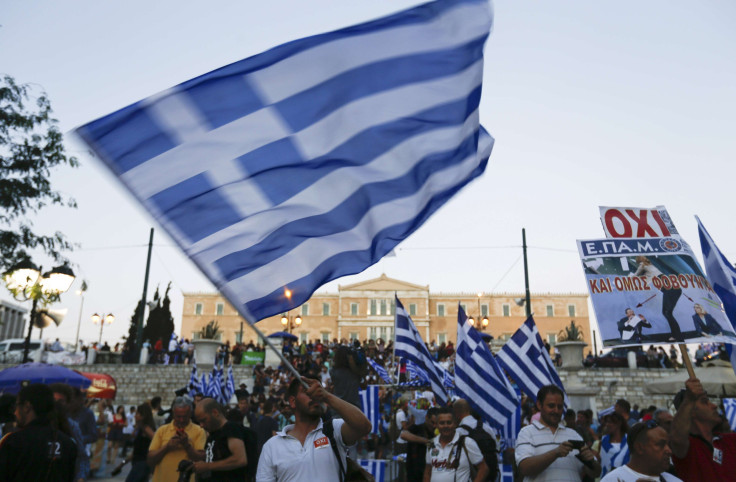Greek Referendum Live Results Update: 'No' Vote Set To Win With 61% Says Greek Interior Minister Nikos Voutsis

UPDATE 5:20 p.m. EDT: Greek Prime Minister Alexis Tsipras Sunday hailed the defeat of a referendum on EU bailout terms and dismissed talk the "no" vote effectively puts Greece on an exit path from the eurozone, Reuters reported.
"With the difficult circumstances prevailing today you made a very brave choice," Tsipras said in a televised address to Greeks. "I'm fully aware the mandate you gave me is not one of a rupture with Europe but a mandate to strengthen our negotiating position to seek a viable solution."
Tsipras called for a meeting of political leaders to talk about the situation.
UPDATE 4:45 p.m. EDT: Eurogroup finance ministers plan to meet this week to discuss the outcome of the Greek referendum, said Michel Reijns, a spokesman for chairman Jeroen Dijsselbloem. The meeting is expected to take place later this week, Reuters reported.
Greece's former prime minister announced he is stepping down as head of the conservative New Democracy party. Antonis Samaras said the party "needs a new start."
UPDATE 4 p.m. EDT: German Economy Minister Sigmar Gabriel said Sunday he doubts more talks will be possible following Greek voter rejection of bailout terms, Reuters reported.
"With the rejection of the rules of the euro zone ... negotiations about a program worth billions are barely conceivable," Gabriel, leader of the Social Democrats (SPD) who share power with Chancellor Angela Merkel's conservatives, told the daily Tagesspiegel.
"Tsipras and his government are leading the Greek people on a path of bitter abandonment and hopelessness," he said, adding Tsipras had "torn down the last bridges on which Greece and Europe could have moved towards a compromise."
Greece's finance minister, however, called the vote a big "yes" for democracy.
BREAKING: German Vice Chancellor Gabriel - Tsipras has torn down last bridge of compromise. #GreeceReferendum #GreekCrisis
- Reuters Top News (@Reuters) July 5, 2015
BREAKING: Greek Finance Minister says today's 'No' is a big 'Yes' to democratic Europe. #GreeceReferendum
- Reuters Top News (@Reuters) July 5, 2015
Original post:Citizens of the world’s oldest democracy went to the polls Sunday to weigh in on Greece’s historic debt crisis, with a clear majority so far voting against the austerity demands of international creditors. Greece’s Interior Ministry has released an official projection, showing a “No” vote is set to win by 61 percent, signaling a substantial majority of voters were in step with the newly elected leftist government, the Associated Press reported.
Nikos Voutsis, Greece’s interior minister, said during a news conference in Athens the participation rate was over 50 percent, meaning the referendum is legally valid because the threshold is 40 percent.
"The assessment of Singular Logic is that the result in favor of 'No' will exceed 61 percent," an official from Singular Logic, which processes the results for the interior ministry said, according to CNBC.
Greek Finance Minister Yanis Varoufakis said the government would strike a deal with its lenders in 24 hours if a “No” vote prevailed.
Greeks who voted "No" in the referendum were rejecting the austerity demands of international creditors, whereas Greeks who voted "Yes" were casting a vote in favor of an acceptance of bailout funds in exchange for Greece agreeing to budget cuts and other austerity measures set forth by the lenders.
European Union authorities made a last-ditch offer to Athens Tuesday to save the country from going bankrupt, in what Greek citizens hoped would be an 11th-hour deal with creditors. However, Greek Prime Minister Alexis Tsipras has refused up to this point to accept the tough austerity measures creditors are demanding — tax hikes and pension cuts — in exchange for bailout funds. The major obstacles during negotiations have been pension reforms and VAT discounts for the Greek islands.
After negotiations collapsed last weekend, the Greek government announced Sunday's bailout referendum. Tsipras expects a “No” vote will enable him to come back stronger to the negotiating table.
Talks between Greece and its international creditors have stalled multiple times in the last four months. Greece struck a deal with the European Union (EU) in February to get 7 billion euros ($8 billion) in extra bailout funds, in exchange for economic reforms. The deal specified that the funds would not be released until Tsipras’ administration submitted reform plans that were approved by the country’s three creditors -- the International Monetary Fund, the European Central Bank and the European Commission.
© Copyright IBTimes 2024. All rights reserved.






















